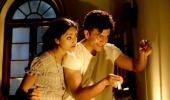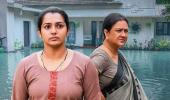People turn a corner and overhear secrets, men change stripes so as to acquire shades of villainy most convenient to advancing the plot, secondary characters confess to past sins just so that the leading women are absolved of all responsibility, notes Sreehari Nair.

Christo Tomy's Ullozhukku is set up like a great, tensely wound short story.
As in a great short story, Christo gives us a tantalising premise full of juicy particulars such as an extra-marital affair and the resulting pregnancy.
He gives us a scene of death capped by a sudden spurt of tears.
He gives us a cavalcade of characters stranded in a house of mourning.
As in a great short story, Christo draws up a sharply defined setting: This is the Kuttanad of canals and coconut groves and women rowing little boats in the dead of the night to meet their slobbering lovers.
The inclement weather, as in so many great short stories, gets to assert itself with such stubborn intensity that you shouldn't be surprised if some critic were to announce, 'The weather is yet another character in the story.'
Having primed us for a tale of human interconnectedness, Christo Tomy then goes ahead and drops the ball.
He finds a way to deify his two leading women characters (played by Urvashi and Parvathy) at the expense of almost every other character in the story.
With an overlay of extreme good taste, the young writer-director falls back on some of the worst tropes of tabloids and soap operas: People turn a corner and overhear secrets, men change stripes so as to acquire shades of villainy most convenient to advancing the plot, secondary characters confess to past sins just so that the leading women are absolved of all responsibility.
An entire ecosystem is reduced to sand even as Urvashi and Parvathy are raised to the level of spotless shrines. Like two Bergman beauties caught up in the whirligig of life, they beat on, boats against the current and all the rest of it.

Though a lot seems to transpire, and despite the steady stream of revelations, I thought the scope of the story became narrower and narrower as the movie went on, and the characters played by Urvashi and Parvathy less interesting with each passing frame.
As an ardent fan, I know it takes a lot to make Urvashi uninteresting, and the rather soft-minded Leelamma here does not rank among the actress' most involved performances.
At her freest, Urvashi becomes a spokesperson for the moviegoer's most mischievous instincts.
No other Indian actress has so frequently needled at the excesses of her co-actors and thereby made them more humanly appealing (Jayaram springs to mind), or played around with the platitudes presented to her by scriptwriters and thereby rescued characters from banality (Thalayana Manthram springs to mind).
With Urvashi, you always get the feeling that she's talking to the people she's sharing screen-space with while simultaneously engaging in a continuous conversation with her audience.
Watch out for how Varane Avashyamund takes off once Urvashi enters the fray: She breaks the dreamy, faraway tone of the movie and opens a direct channel with us bums-in-the-seats.

On the other hand, Leelamma of Ullozhukku comes off as nothing more than a delusional doll of a mother.
She has none of the smarts that one associates with a finely honed Urvashi character.
There's no 'intelligence of the hearth' or 'low cunning' that you can discern about this Achayathi.
The only time she drops her gallant guard is when Alencier's greybeard character says something to the effect of, 'If this happens, I'll take my own life,' and Leelamma replies, with the piss and vinegar of Urvashi's good old days, 'Dude, do you really want to go that far?'
Her response seemed to enliven the proceedings for a bit, though it did depart from the somber mood of the movie. I was the only one in my theatre who laughed, and it was almost like yelling 'Fire!' in a crowded place.
Christo Tomy seems to have contrived Leelamma for that final shot of her as the grieving mother with absolutely no complaints. Tomy's last outing was Curry & Cyanide, a documentary about Jolly Joseph, and Leelamma seems to be his atonement for the murderous housewife.
At any rate, here's the double bind evident throughout Ullozhukku: The movie wants to cast an unsparing eye but it also wants to spare its two leads any overt soul-searching (that's for the subsidiary characters).
In fact, Urvashi's Leelamma is made to face the music just once, and it happens when Parvathy's Anju schools the aging woman, schools her about the deceptions in her worldview and about the dangers of holding on to age-old traditions.
If Leelamma has no complaints whatsoever, her daughter-in-law, Anju, is all complaints; and Parvathy playing Anju is, in every sense of the term, perfect casting.
For some years now, Parvathy's screen performances have come to suggest that the audience owes her a collective apology which she isn't getting (an apology for what exactly, I am not sure).
It's the same set of ideas that emanate from every Parvathy performance.
Here are two or three that I have managed to catch: life is a bland porridge that one is obliged to eat indifferently; love is a prison; small-talk is for airheads.
At her most instinctive, Parvathy Thiruvothu is our finest actress but she seems to have become too ideological to give herself over to the camera completely.

This one is yet another ideological construct.
By the end of the movie, all of Anju's misgivings are rationalised -- yet another self-exculpation project for the actress.
In playing the 'misunderstood woman' card over and over again, Parvathy may be taking on the worst tendencies of those yesteryear movies which had an all-sacrificing patriarch as its main focus. We are not so much overthrowing the culture of self-pity here as dressing it up in different clothes.
So Anju and Leelamma beat on, boats against the current and all the rest of it.

The final shot is a clarion call for amateur painters to come recreate it as an everlasting image of universal sisterhood.
That shot, I think, is as literal-minded as the movie itself, but if social media is to be believed the painters have already answered the call.
Finally, a few words about the title.
It translates to 'undercurrent', and it's meant to be a poetic qualifier for the setting and for the general progression of events.
But the title is a misnomer when you weigh it against the craft of the movie.
This is a movie where everything is spelled out, and nothing even remotely implied.
Sometimes with a threatening look, and sometimes with the discovery of an old file, skeletons are unearthed, and the story is steered to its faux-poignant conclusion.
No, you don't need undercurrents or overtones when a deluge of pure plot twists would do.












 © 2025
© 2025